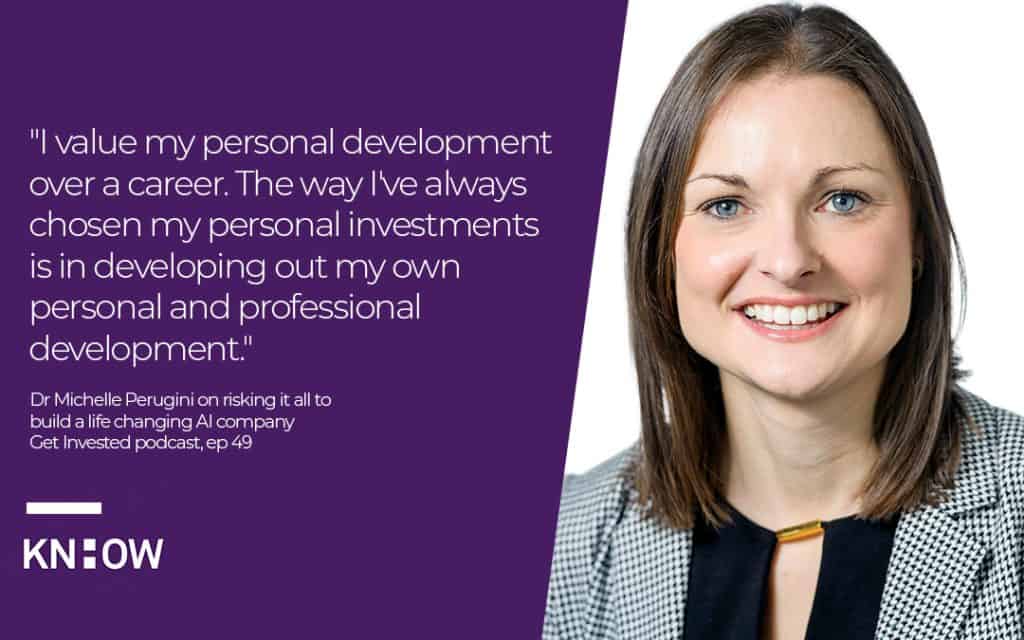With three Artificial Intelligence companies to her name, Dr Michelle Perugini appears to be a born entrepreneur.
After her first company was acquired by Ernst & Young, Michelle started Life Whisperer, an AI company improving IVF outcomes for couples wanting children, with another parallel AI business, Presagen.
But it wasn’t long ago that Michelle was on a very different trajectory. Before becoming a tech founder, Michelle was settled as a successful researcher.
“(It was) very challenging making those decisions and going from a very structured career type role, whereby you do well, you move up the ranks, you have a job for life,” Michelle told Bushy Martin on the Get Invested podcast.
“I value my personal development over a career, per se. I think the way that I’ve always chosen my investments, and it’s always been personal investments, is really in developing out my own personal and professional development and that of the people in the companies that I’m working in.”
Michelle’s co-founder is her husband, Dr Don Perugini, who led the couple into the startup world.
“It was his kind of discontent in a standard job that he had in the Department of Defence, where he felt like his ambitions were just not being served,” she said.
“He wasn’t able to do the bold things that he really wanted to do within the area, and I said to him one day, it was actually my idea, ‘you need to stop and you need to get out of that situation because it’s making you bitterly unhappy. It’s not serving your ambition, and you need to work out something else to do because this is not working’.”
While some couples can’t imagine working together, the Peruginis have found a competitive advantage.
“I think the big thing is having that support network when things go bad, and often things do go bad in business,” Michelle said.
“In fact, more times than not, they go bad. You need someone who understands the experiences that you’re having and the situation that you’re going through so that when one of you completely loses it, the other one can come and provide that voice of reason and try and get things back on track. So, yeah, I think it’s been a huge advantage for us.”
Having sold her first company, Michelle could’ve enjoyed the fruits of the success and taken the easy road. But there were more complex problems to solve.
That’s exactly what drives me,” she said.
“It’s about having that big problem or big goal or big challenge and then paving a way using whatever resources are available by way of technology, expertise, bringing together strong teams, and then really solving that problem, but solving it in a very practical way. I think one of the challenges that I had being in a research career was I had that challenge of solving big problems and very deep and technical problems, which I really loved, but I rarely saw a practical application from the solving of these problems, and I really like when it actually changes an industry or solves that problem for people. That’s what I’ve been fortunate enough to be able to do in my business career.
“There’s a lot of investment that goes into that in terms of education, in terms of funding businesses to be able to tackle those sorts of problems, and then really setting out to solve those problems in a really fearless way without, I guess, too much concern of whether it’s going to work or not. But the knowledge that I’ve done the absolute best I possible can, and that I’m well equipped to be able to solve those problems.”
Pursing the answers to complex questions is hard, and Michelle has at times learned the hard way.
“But those learnings are necessary learnings, and they’re not things that you can get out of a book,” she said.
“You have to actually experience them. You have to experience the impact of doing things wrong. You have to experience the impact of not being responsive to your customers and then walking away. You have to experience the impact of not having enough money to hire the right people to be able to deliver the best possible product or service that you would like to. You have to understand the impact of having an employee who doesn’t pull their weight or is not the right fit for your business and having to let them go. There’s so many things that happen within a business at teach you resilience and teach you how to move forward.
“I think one of the biggest things is, and I often say this to my children, if you don’t experience those challenges, you have no appreciation of the good things, the good outcomes that you get in life. If you’re just given everything on a silver platter, and it’s all easy and sweet, you’re missing out. You’re missing out because you have a very low level appreciation of what it’s like to actually overcome something and achieve happiness by overcoming that challenge. I think that’s something that I live by.
Listen to the full interviews here.
Want to Know How you can build wealth with property with the help of leading, qualified experts? Talk to the team at KnowHow, now.




